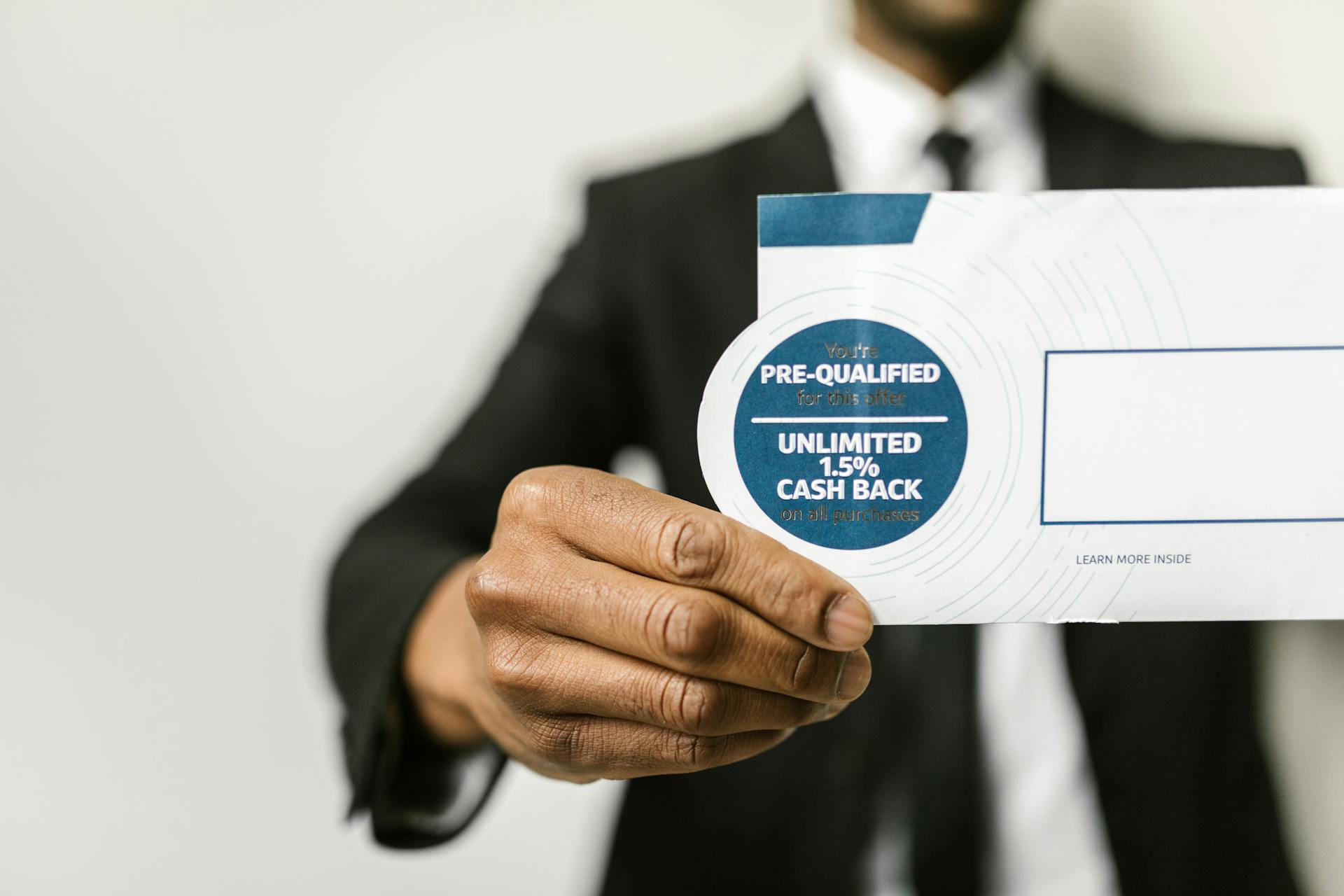
Dealing with debt collectors can be stressful, especially when they start calling your home and work. This constant barrage of calls can make you feel anxious and overwhelmed.
To stop debt collectors from calling your home, you can request that they stop contacting you through a process called a "cease and desist" letter. This letter is a formal request to the debt collector to cease all contact with you.
According to the Fair Debt Collection Practices Act, debt collectors are only allowed to contact you at your home if you have given them permission to do so. If you haven't given them permission, they should stop calling your home.
You can also request that debt collectors stop calling your work by sending them a letter or making a phone call to inform them of your work schedule and request that they contact you at a different time.
For another approach, see: Why Are Debt Collectors Calling Me
What to Expect
If you've asked a debt collector to stop contacting you, here's what you can expect. They're not allowed to communicate with you again, except in a few specific situations.
Once they receive your request, they'll likely send you a final notice telling you there will be no further contact. This is their way of complying with your request.
They might also advise you that they or the creditor may take other actions they're legally allowed to take, such as filing a lawsuit against you.
If you're disputing the debt, it's essential to respond to the debt collector in writing, even if they provide the validation information over the phone or through email.
Stopping Harassment
If you're being bombarded with debt collection calls, it's essential to know your rights. You can request that the debt collector stop contacting you, and they must comply. Once you've made this request, they're only allowed to communicate with you again to inform you that they won't be contacting you further.
If the debt collector continues to contact you after receiving a written notice to stop, they're likely violating the Fair Debt Collection Practices Act (FDCPA). You can sue them for violating the FDCPA and potentially win damages and have your attorney's fees paid.
Check this out: How to Sue Debt Collectors for Fdcpa Violations
To stop debt collector calls, you can send a cease-and-desist letter. This letter should be sent via certified mail and include a return receipt. You can use a template from the Consumer Financial Protection Bureau (CFPB) to make it easier.
Here are some key points to include in your cease-and-desist letter:
- A clear statement that you're requesting the debt collector stop contacting you
- Your name and address
- The debt collector's name and address
- A request for written communication only
It's also a good idea to keep a copy of the letter for your records.
If you're unsure about the legitimacy of the debt, you can request verification from the debt collector. They must provide you with written confirmation of the debt, including the amount you owe and the collection agency's name and contact information.
Negotiating with
Negotiating with debt collectors can be a viable option if you're able to repay the debt and feel comfortable negotiating. You can work directly with a collection agency to set up a payment arrangement or lump sum settlement.
Collection agents often work on commission, but they may be willing to accept a reasonable payment arrangement since collecting something is better than nothing. Be professional in your approach.
Always get payment arrangements in writing to avoid any misunderstandings. Keep detailed records of your conversations and agreements.
Don't be pressured into making promises you can't keep. It's essential to be realistic about what you can afford to pay.
You might like: Why Do I Keep Getting Calls from Oregon?
Accommodations and Don'ts
Dealing with debt collectors can be stressful, but there are certain accommodations you can make to minimize the calls.
The Fair Debt Collection Practices Act requires debt collectors to stop calling you at work.
If you're getting calls at work, let your employer know and ask them to tell the collector to stop calling.
It's also a good idea to keep a record of the calls, including the date, time, and details of what was discussed.
Recommended read: Can You Force Debt Collectors to Stop Calling You
Keep Good Records
Keep a record of any letters, documents, or communications from a debt collector, including dates and times of conversations and notes about what you discussed. These records can help you if you're disputing the debt or going to court.
Write down everything, including phone calls and emails, so you can refer back to it later.
Make a copy of any letters you send to the debt collector and send the original by certified mail with a return receipt to prove they received it.
If you send a letter electronically, be sure to keep a copy.
Be careful what you say to a debt collector because they keep records too, and anything you say can be used against you.
Recommended read: Debt Collectors Keep Calling Me
Work Accommodations

Work Accommodations are a great way to ensure everyone has an equal opportunity to succeed.
Providing a quiet workspace can be a reasonable accommodation for employees with sensory sensitivities, as seen in the example of John who struggles with noise.
Flexible scheduling can also be beneficial for employees with caregiving responsibilities, such as Sarah who needs to take her child to school.
Modifying equipment or tools can be a simple accommodation, like providing a keyboard with extra space for employees with mobility impairments, as in the case of Alex who has limited dexterity.
Some accommodations can be made with little to no cost, such as reorganizing the workspace to reduce clutter and distractions.
Don'ts
Don't offer "good faith" payments over the phone, as this can reset the clock on the statute of limitations and give the debt collector more time to take legal action.
If a debt collector calls, ask for written validation of the debt first. Agreeing to the debt without verification can limit your chances for a dispute.

Don't use hostile language when speaking with a debt collector, as the call is likely being recorded and aggressive language could damage your case if the call is reviewed in court.
Be cautious of for-profit credit-repair companies, as the Federal Trade Commission recommends avoiding them due to the high likelihood of scams.
Understanding Debt Collection
You can't erase debt with a magic phrase, but you do have the right to verify whether or not you owe the money.
Debt collectors can be relentless, but you can dispute illegitimate debts.
You have the legal right to stop collectors from contacting you by putting your cease-and-desist request in writing.
The Myth of the 11 Word Phrase
Debt collectors often try to scare you with misinformation. There's a rumor that a specific 11-word phrase can stop them, but it's just a myth.
Deceptive ads and misinformation have been circulating about this supposed magic phrase. The reality is that you can't just erase debt.
Check this out: 11-word Phrase to Stop Debt Collectors
You do have the right to verify whether you owe the money, which is a good thing. You can dispute illegitimate debts, which is a powerful tool.
Putting your cease-and-desist request in writing is key. This can stop debt collectors from contacting you, as they're legally required to do so.
Advantages of
Getting debt collectors to stop calling can be a huge relief, and it's actually a legal right you have. Excessive calls and threats can be part of a debt collector's strategy to get you to send money, so it's essential to know your rights.
Talking to a debt collector can make your situation worse. If you tell a debt collector you're going to send money but then don't follow through, you could accidentally extend the statute of limitations, which is the amount of time the collector has to sue you.
Using your legal right to end these calls can give you time to determine if you really owe the money. This is a crucial step in understanding your debt situation and making informed decisions about how to move forward.
For your interest: Legal Help with Debt Collectors
Eliminating Debt
Eliminating debt can be a daunting task, but it's a crucial step towards financial recovery. A Licensed Insolvency Trustee (LIT) can help you understand all your options for stopping collection calls permanently.
A LIT is trained and licensed to provide government-regulated debt relief solutions, including consumer proposals and bankruptcy. These solutions offer protections from creditors that other advisors cannot provide.
During a free consultation with a LIT, you can expect a review of your financial situation, including your debts, income, and assets. This review will help identify the best course of action for your specific situation.
Your LIT will also explain your rights when dealing with collection agencies, and review all available debt relief options. This will give you a clear understanding of how each option affects collection calls and your credit score.
Here are some key steps you can expect during a free consultation with a LIT:
- Complete a review of your financial situation, including your debts, income, and assets
- Explain your rights when dealing with collection agencies
- Review all available debt relief options
- Discuss how each option affects collection calls and your credit score
- Help you develop a payment plan that provides debt relief and stops collection calls
A LIT will work with you to develop a payment plan that provides debt relief and stops collection calls. This plan will be tailored to your specific financial situation and will help you get back on track.
Additional reading: Will Debt Collectors Negotiate
Verify the
Before dealing with debt collectors, it's essential to verify the debt is indeed yours. You can do this by getting some information from the collector.
Collect details about the debt, including who the original creditor was, when and how the debt was incurred, and what the balance is, including interest charges and fees.
Find out who you're speaking with, and record the agent's name and the company's name, address, and telephone number.
The collector is required to send a written validation of the debt within five days, so ask for this.
You can also ask the collector to stop contacting you except by mail.
Here are the key points to verify the debt:
- Original creditor and debt details
- Collector's name, company, address, and phone number
- Written validation of the debt
- Request to be contacted only by mail
Once you have the details, you have 30 days to check if the debt belongs to you. You can verify this by looking through your financial records, including bank statements, receipts, and old bills. You can also pull your free credit reports to confirm where the debt originated.
Frequently Asked Questions
What is the 11 word phrase to stop debt collectors?
To stop debt collectors, use the 11-word phrase: "Please cease and desist all calls and contact with me, immediately." This phrase can provide significant protection against aggressive debt collection practices.
What is the 777 rule with debt collectors?
The 7-7-7 rule restricts debt collectors from making more than 7 calls within 7 days about a specific debt and prohibits calls within 7 days after a previous conversation. This rule aims to protect consumers from harassment and excessive contact.
What happens if you tell a debt collector to stop contacting you?
Telling a debt collector to stop contacting you only stops the calls, not the debt, and may trigger a lawsuit instead. To effectively stop calls, clearly state "Stop calling me. Cease and desist. Do not call me again
How do I get rid of debt collectors without paying?
To stop debt collectors from contacting you, send a Cease and Desist Letter through a professional credit expert or attorney. This formal letter will request the debt collector to stop contacting you, and keep a copy for your records.
Sources
- https://www.consumerfinance.gov/ask-cfpb/how-do-i-get-a-debt-collector-to-stop-contacting-me-en-1411/
- https://www.incharge.org/debt-relief/credit-counseling/bad-credit/how-to-stop-collection-calls/
- https://casetext.com/analysis/dont-be-harassed-here-is-how-to-stop-collection-calls
- https://www.hoyes.com/debt-relief/stop-collection-calls/
- https://www.steffenslaw.com/blog/how-can-i-stop-collection-calls-at-work/
Featured Images: pexels.com


